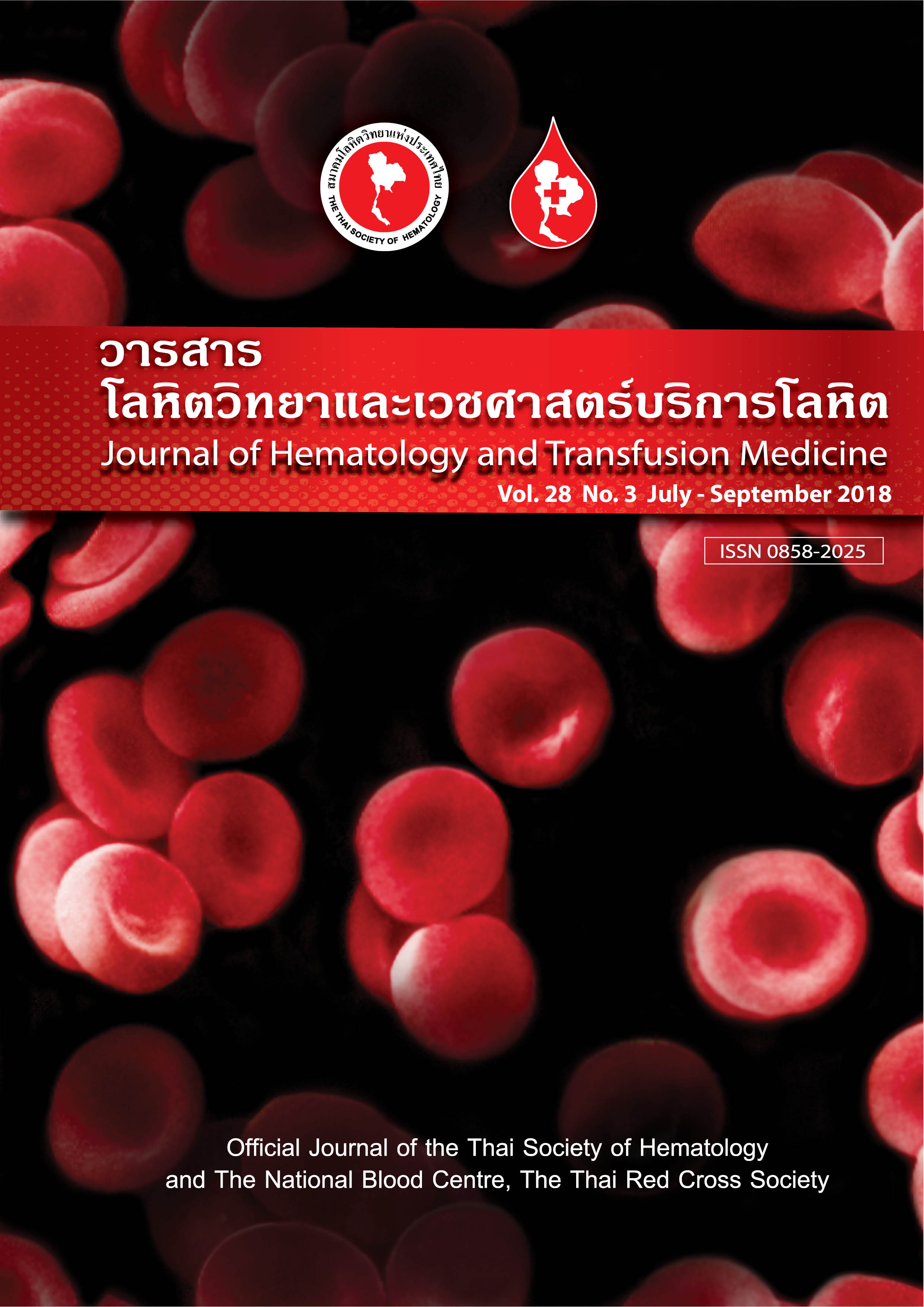Literature review: Approach to neutropenia in adult
คำสำคัญ:
Neutropeniaบทคัดย่อ
Neutropenia is defined as absolute neutrophil count less than 1,500/µL. This condition may be caused by congenital or acquired conditions. The most common cause is drug that either induced direct bone marrow suppression e.g. chemotherapy or immune-mediated mechanism. Other causes are infections, autoimmune diseases, malnutrition, and bone marrow diseases. The diagnosis of cause of neutropenia is made by history, physical examination, examination of complete blood count, blood smear, and additional appropriate investigations. Treatment composes of management of underlying cause, empirical antibiotics in case of fever or severe symptoms and granulocyte-colony stimulating factor that indicated in neutropenic patients with severe or recurrent infection.
Downloads
เอกสารอ้างอิง
2. Boxer LA. How to approach neutropenia. Hematology Am Soc Hematol Educ Program 2012;174-82.
3. Copelan E, Avalos B, Friend R. Assessment of neutropenia. BMJ Best Practice 2016. From http://bestpractice.bmj.com/best-practice/monograph-pdf/893.pdf cited 20th April, 2017.
4. Schwartzberg LE. Neutropenia: etiology and pathogenesis. Clin Cornerstone 2006;8[Suppl]:S5-S11.
5. Lawasut P, Na Nakorn T, Rojnuckarin P, Intragumtornchai T. The prevalence of asymptomatic neutropenia in Thai population: an initial report. J Hematol Transfus Med 2010;20:191-5.
6. Hsieh MM, Everhart JE, Byrd-Holt DD, Tisdale JF, Rodgers GP. Prevalence of neutropenia in the U.S. population: age, sex, smoking status, and ethnic differences. Ann Intern Med 2007;146:486-92.
7. Donadieu J, Fenneteau O, Beaupain B, Mahlaoui N, Chantelot CB. Congenital neutropenia: diagnosis, molecular bases and patient management. Orphanet J Rare Dis 2011;6:26.
8. Culakova E, Thota R, Poniewierski MS, et al. Patterns of chemotherapy-associated toxicity and supportive care in US oncology practice: A nationwide prospective cohort study. Cancer Med 2014;3:434-44.
9. Limvorapitak W, Khawcharoenporn T. Incidence, risk factors, and outcomes of febrile neutropenia in Thai hematologic malignancy patients receiving chemotherapy: A 6-year retrospective cohort study. Asian Pac J Cancer Prev 2015;16:5945-50.
10. Smith TJ, Bohlke K, Lyman GH, et al. Recommendations for the use of WBC growth factors: American Society of Clinical Oncology Clinical Practice Guideline update. J Clin Oncol 2015;33:1-14.
11. Andersohn F, Konzen C, Garbe E. Systematic review: agranulocytosis induced by nonchemotherapy drugs. Ann Intern Med 2007;146:657-65.
12. Lamy T, Moignet A, Loughran Jr TP. LGL leukemia: from pathogenesis to treatment. Blood 2017;129:1082-94.
13. Freifeld AG, Bow EJ, Sepkowitz KA, et al. Clinical practice guideline for the use of antimicrobial agents in neutropenic patients with cancer: 2010 update by the Infectious Diseases Society of America. Clin Infect Dis 2011; 52:e56–e93.
14. Andres A, Maloisel F. Idiosyncratic drug-induced agranulocytosis or acute neutropenia. Curr Opin Hematol 2008;15:15–21.
15. Aapro MS, Bohlius J, Cameron DA, et al. 2010 update of EORTC guidelines for the use of granulocyte colony stimulating factor to reduce the incidence of chemotherapy-induced febrile neutropenia in adult patients with lymphoproliferative disorders and solid tumours. Eur J Cancer 2011;47:8-32.
16. Kuderer NM. Meta-analysis of randomized controlled trials of granulocyte colony-stimulating factor prophylaxis in adult cancer patients receiving chemotherapy. Cancer Treat Res 2011;157:127-43.
17. Kuderer NM, Dale DC, Crawford J, et al. Impact of primary prophylaxis with granulocyte colony-stimulating factor on febrile neutropenia and mortality in adult cancer patients receiving chemotherapy: A systematic review. J Clin Oncol 2007;25:3158-67.
18. Mhaskar R, Clark OA, Lyman G, et al. Colony stimulating factors for chemotherapy-induced febrile neutropenia. Cochrane Database Syst Rev 2014;10:CD003039.
19. Bouteloup M, Perinel S, Bourmaud A, et al. Outcomes in adult critically Ill cancer patients with and without neutropenia: a systematic review and meta-analysis of the Groupe de Recherche en Réanimation Respiratoire du patient d’Onco-Hématologie (GRRR-OH). Oncotarget 2017;8:1860-70.



